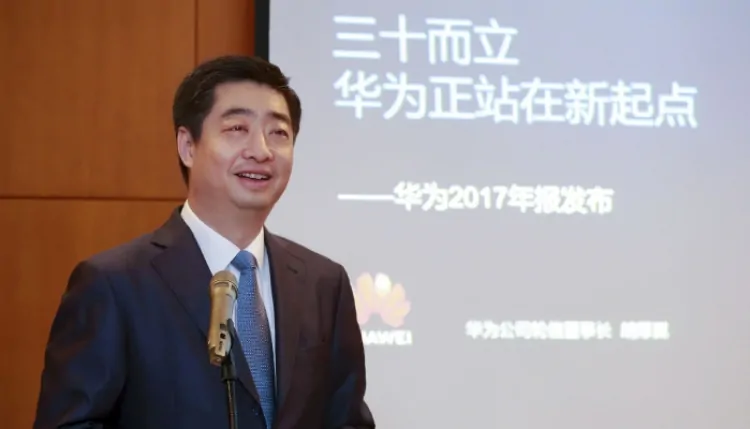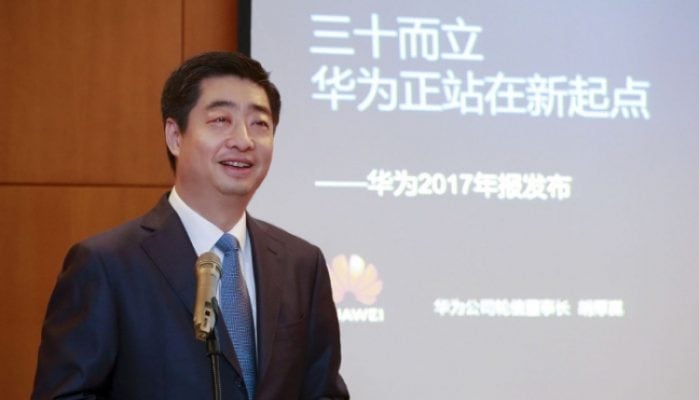Business, News & Analysis
Huawei’s 2017 Profit Growth Helps Explain P20 Pro’s Price
There were at least a dozen signs from the recent launch event of Huawei’s P20 flagship phone series to suggest that the Chinese tech and telecommunications giant has made it as a premium consumer electronics brand: the launch was held at the picturesque (and obviously not cheap to rent) Grand Palais; more than 2,000 members of the media in attendance; dozens of Huawei billboards plastered all over Europe; and perhaps most importantly — the lack of surprise, shock or disappointment over the more than $1,100 price tag of the P20 Pro.
Ken Hu, Huawei’s current CEO. Photographer: Tomohiro Ohsumi/Bloomberg
Attendees — tech insiders, mostly — expected the top end model of Huawei’s smartphones to be priced at (or even more than) the iPhone or Samsung level.
And why wouldn’t they? Despite recent U.S. market issues, Huawei phones are well received by tech writers and, apparently, selling well.
In an annual business report meeting with journalists (including myself) held Friday morning at the company’s Shenzhen headquarters, Huawei announced that its total revenue grew 15.7% to $92.5 billion (or 603.6 billion yuan) in 2017. More impressively is that net profit actually grew 28.1% over that same time span to $7.3 billion, a huge improvement over 2016’s profit growth rate of 0.4%.
Huawei’s deputy chairwoman and chief financial officer Sabrina Meng, along with current CEO Ken Hu, told reporters there are two factors that explains how the company managed to bump up net profits and net profit margins at a rate higher than total revenue growth: the company became more efficient in cost and growing smartphone sales.
“In 2016, one of the biggest areas that dragged Consumer Business Group profits down were the high cost of components,” said Meng. “So we developed better a better supply management chain and improved our working relationships with vendors.”
Hu, meanwhile, added that whether it’s brand image with consumers or phone units sold, the company saw significant improvements in 2017. According to data released to the media, Huawei and sub brand Honor combined to sell 153 million handsets in 2017, generating $37.85 billion (237.2 billion yuan) in sales.
The triple camera Huawei P20 Pro
The privately-owned Chinese company’s main bread and butter, however, is still selling network equipment, which generated roughly $47 billion (297 billion yuan) over the last year, though in terms of growth percentage, the 3% rate is tepid compared to years past or Huawei’s other departments. Huawei also saw a 35.1% growth in its enterprise business unit, which handles cloud and data, though the overall revenue figure of $8.7 billion (54.9 billion yuan) is small.
Until 5G kicks in in another year or so — which Hu says Huawei is on track, by the way — the company’s fastest growing and most visibly prominent area is its smartphones.
Despite having virtually no market in the U.S., Huawei still sold enough units to surpass Apple to become the second biggest phone brand in the world by units shipped, and the company’s bold strategy to ditch the mid-tier or entry-level market and focus mostly on premium (aka expensive) smartphones seems to be paying off.
This year marks Huawei’s 30th birthday and the company, following the general Chinese idea that age 30 is when a boy truly becomes a man, is looking for new growth.
“As we look to 2018, emerging technologies like the Internet of Things, cloud computing, artificial intelligence, and 5G will soon see large-scale application,” explains Hu. “Throughout this process, Huawei will … pay special attention to the practical challenges that our customers face as they go digital. Our job is to help them overcome these challenges and achieve business success. Ultimately, we aim to bring digital to every person, home and organization for a fully connected, intelligent world.”
It doesn’t look like Huawei’s vision will include the U.S. for now — but that may just be okay.
Source: Forbes.
Diamu Blog Team.




















